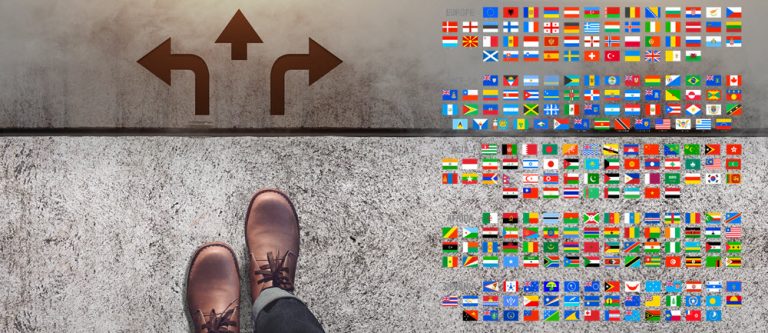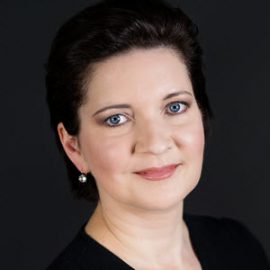Transitioning into intercultural training as a career
Jan 31, 2018 · by Manuel Heidegger

Twenty-year itch
Careers are habit forming. Many of us go deep and become specialists. We grow roots into a certain professional field as our everyday ties to our work strengthen. We get paid (reward), we surround ourselves with the people, objects and tools of the work (reminders) and we get good at what we do, in some ways so good that we can do parts of the work automatically (routine).
Rewards, reminders, routines inside the comfort zone
After twenty years in the language-training business in Italy, the rewards, the reminders and the routines had grown very strong for Lara Statham. The easy path, the most likely scenario, was to continue the status quo careerwise.
Seeing a path into something new
Lara Statham
Providing a range of intercultural training and coaching for companies and individual executives, Lara is based in Turin Italy. Her specialist interest is UK-Italian cultural interaction.
More on Lara Statham
For Lara to recognise the real possibility of change, something dramatic was needed. The drama was delivered by the economic disruption of the 2007- global financial crisis, which hit Italy hard. As a chaotic economic situation brewed around her, Lara realised that she had an opportunity to make a dramatic change in her own professional life. Her future would not be the status quo. She needed a new path.
By 2017, Lara’s professional transformation was complete and we in the Argonaut team were delighted that she joined as a Cultural Correspondent for Italy. We heard her story and asked her to share some insights for other people considering a move into the fascinating field of intercultural competence development.
Ramping up the culture
Cultural factors and business advice were already a part of Lara’s work in the language business, but they were not the focus. She worked with senior managers, building their capacity for using the English language. As the years passed, she increasingly taught her clients how to communicate effectively, participate in meetings, write powerful text, and negotiate in English. The goal of the training was analysis and proper use of language.
Cultural competence for free

Her clients expected language training and paid for improved language skills. So, as Lara says “for my clients, getting stronger intercultural competence was a nice extra which did not appear on the invoice”.
The first step in Lara’s transformation was recognising that some building blocks of an intercultural career were already present in her language teaching role and her qualifications as an educationalist. She decided to go further in the intercultural business consulting, and took a teaching post at the University of Turin’s Department of Economics. Language was still the focus. The lessons were structured around analysing grammar, but the context for her newer clients was very much about getting new skills for better business results.
Widening the focus
Lara was starting to talk business with business leaders. Her own business as an independent language training provider in Turin continued in parallel, but Lara’s interest in the business impact of cultural competence just grew.
I didn’t wait to be lucky. I worked hard to create every new relationship
You’ve got to love it
A career switch would not be easy. It requires commitment, passion, energy and perseverance. Lara considered her options. It was not hard to see that intercultural consultancy would be a rich source of professional interest.
But intellectual curiosity into cultures is not enough. Lara also considered the format of intercultural coaching, training and consultancy. How would it feel in practice?
“I get so much satisfaction from working on a one-to-one basis with my clients” says Lara. “And small groups too. I am able to stay in contact with my clients, see the impact. It is so enriching to hearing about their successes after our training.”
Testing the idea
Becoming an intercultural coach and consultant felt like the right move to Lara. But what would other people think? She decided to find out. “I sounded people out about the idea, people I knew who knew me. They immediately backed me. Through dozens of conversations with business insiders, my vision crystallised and my ambition solidified. I would do this.”
Lara joined got involved with internations, joined international clubs, expat women’s groups, started to “network like crazy”. In each new scene, her new career path got warm approval.
Beginning a transition
Things seemed to move fast, because Lara was detaching herself from the routines, reminders and increasingly also the rewards of her first career.
But indeed, this was a transition, a gradual shift. The only step change was in ambition and orientation. Practical changes came more slowly.
In her language and communication skills training, Lara rapidly dropped out the grammatical nit-picking. She focused more on the context of communication, extracting insights from different kinds of work situations face by her clients.
The original language-culture balance began to reverse. Increasingly, language came as the bonus for customers (English is usually the language of Lara’s trainings).
Becoming an interculturalist: to do list
While there are successful self-taught interculturalists working in the field, Lara is not one of those. After her firm decision in 2011 to begin a career change, Lara dived into research in the field. Her university base was an excellent place to begin. She feasted on books from the founding fathers and mothers of the field, to latest academic articles. She continued to network into the business and participated in remote learning and as well as classroom training.

“A lot of reading was necessary for the transition. The courses gave me some additional new skills, such as coaching and business analysis. One of the most satisfying parts was my systematic programme to build my own intercultural network. I created contacts in other countries, formed bi-lateral partnerships between Italy and UK, travelled a lot to China. My new connections generated projects, and helped convert my career transition from idea into reality.”
But I didn’t wait to be lucky. I worked hard to create every new relationship and to generate every new intercultural project.
After 20 years inhabiting the same language-teaching role, it was fun to introduce myself in as an interculturalist. It was so refreshing to assume a new professional identity.
7 talents of interculturalists our customers want
Jul 28, 2016 · by Richard Farkas
When organisations invest in intercultural training, they look for the best people to deliver the experience as trainers, coaches or partners in development programmes. How well do your talents match those which top organisations are seeking? How much do your customers know what you have to offer?
Still outside the comfort zone
The start was energising, and her current work is highly motivating for Lara, but there has been a tough journey in-between.
“The transition was difficult on a personal level, letting go of my background as a language trainer. I had to challenge myself to think and act in new ways. I adopted a different approach, with more business focus. Creating the new habits was tricky. I had to develop a new kind of offering, write different kinds of proposals, change my identity and represent my projects in new ways.”
“For a long time I needed to remind myself every day to drop those old habits. There was financial pressure to reach new customers and allow the old sources of income to dry up. I did the whole thing in a period of economic downturn.”
The rewards of being a cross-cultural coach
Lara’s tips for a career move into culture
- Network like crazy
- Practise explaining what you do
- Create new routines for yourself
- Stay focused on the new
- Leave your comfort zone every day
- Get a coach
- Access educational resources
Nowadays Lara loves her intercultural work and takes pride in the successes achieved with her clients.
“Of course, people are so much more willing to engage when we are talking culture than previously when we focused on the finer points of English grammar.”
Switching from teacher to coach/consultant has removed the hierarchy from her interactions with clients. Lara notices how her new role has levelled things out. Her clients are more open to discussion. She can sense that people feel they get more value in her intercultural training.
“Now my customers understand that they can be brilliant communicators with somewhat limited language skills. The keys I give them are the insights from the study of culture. What makes an effective communicator or an inspirational leader in a foreign country is very likely different from the qualities expected in your own culture.”


